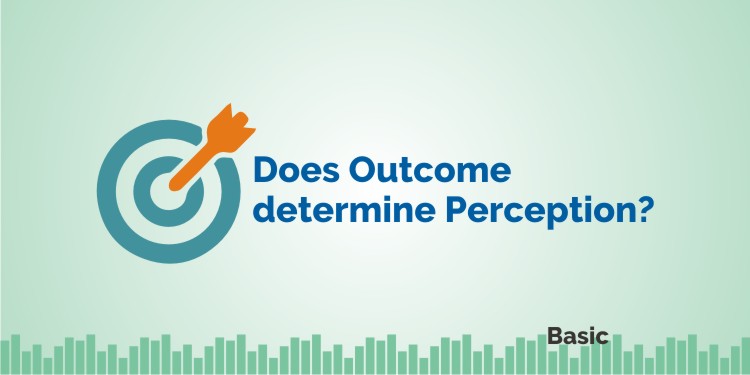This article talks about the importance of having a flexible mindset towards stock market investing in general. To learn more about the different investing tools and how to use them, you can join this course on Elearnmarkets: NSE Academy Certified Capital Market Professional (E-NCCMP).
Have you ever wondered that maybe we all judge the process by its outcome? We praise Mark Zuckerberg for not selling his company, for succeeding in identifying Facebook’s future potential. Yes, his risk proved to be fruitful. But, what about Yahoo! and Groupon? They are lambasted for having ‘irrational’ belief in their business models and for not selling out. In both cases, risk was the same, belief was the same. However, one was chastised while the other was applauded.
The truth is that the line between ‘inspiringly bold’ and ‘foolishly reckless’ is unidentifiable. Nobody can claim to differentiate one from the other. What may lead to one’s prosperity may lead to the other’s collapse. In the end, only the winners are emulated by the rest of the world and when emulation does not lead to similar results, we feel we have just been unlucky.
Luck is a major factor for determining success, especially in the bourses. However, the assumption that your approach is correct just because you have emulated a successful person/business is utterly and completely wrong.
- For starters, we need to understand that strategies which worked in the past were probably successful because they belonged to a different era. History doesn’t always repeat itself. Evolution is the key. Strategies also need to evolve as we move forward into time.
- Secondly, we need to understand that we probably praise the winners more than they deserve and rebuke the losers more than they ought to be. It is more important to learn from an individual or a business who/which has endured risk. We cannot learn much from people who have circumvented around failure and conquered risk, neither can we learn from people who have banged headfirst into it and toppled over. We can only learn from those who have lived to tell the tale.
- Last but not the least, studying case studies and emulating them blindly will not lead us anywhere. We need to look for broad patterns and processes which lead to the discovery of successful strategies, not the strategies themselves.
(You can learn the art of cloning to understand system which aims to replicate the performance of successful fund or fund managers)
Let us take the example of IT sector in the advent of 2000s. The sector was bound to thrive because of the growing focus on computers and automation. However, all companies have not grown massively. NIIT has been a laggard if compared to Wipro, TCS or Infosys. Identifying multi-baggers in one go may seem easy, but in reality, it is an unseemingly difficult task. Thus, if you are able to identify the broad pattern of success, make more than 1 pick and try to be diversified in that sector itself. You may incur losses in a few of your picks but one of them may turn out to be that coveted multi-bagger.
Now, while writing the above article, another thought crossed my mind. Most of us feel that simple things cannot be successful. We try to look for complex strategies and complex ideas which we call out-of-the box ideas. We all know of the various biases prevalent amongst individuals like recency bias, confirmation bias, availability bias, et cetera but very few of us actually recognise and accept this bias – the complexity bias.
“Most Geniuses- Especially those who lead others- prosper not by deconstructing intricate complexities but by exploiting unrecognized simplicities.”
-Andy Benoit
In fact, this perception that complexity is synonymous to being good often leads us to purchase and use products which we do not fully understand. For example, a hair-dye claiming to be “ammonia-free”, or a face cream which contains “peptides”.
“Simplicity is a great virtue but it requires hard work to achieve it and education to appreciate it. And to make matters worse: complexity sells better.”
– Edsger W. Dijkstra

The biggest example of simple ideas being successful is the Parle-G brand. Starting its journey in 1929 with its confectionary brand, it was in 1938 that Parle forayed into biscuits with Parle Glucose. Back in 1930s, biscuit was meant to be a product consumed only by the elite class of the society; it was not affordable to average consumers. The philosophy of Parle was that biscuits should be made available and affordable for every Indian. Today, these biscuits are consumed as more of a staple than like just a biscuit. It is the morning snack of almost every Indian citizen.
Bottomline
The success story of Parle teaches us that simple ideas can turn into massive successful and flourishing ventures. Mahatma Gandhi, with his symbolic white dhoti, was one of the simplest and probably one of the most influential leaders our country has ever seen. We need to let go of our complexity bias and adopt the simplistic approach. We should look at business ventures and look at the basic and simplest aspects of the business: How is the product/service consumed by the society? What is the demand for it? Pricing Power? Bargaining power against suppliers?
These questions need to be answered before looking at how technologically advanced the product/service is? Whether innovative marketing techniques have been adopted? Do they import the raw materials? These are secondary aspects of analyzing a business.








